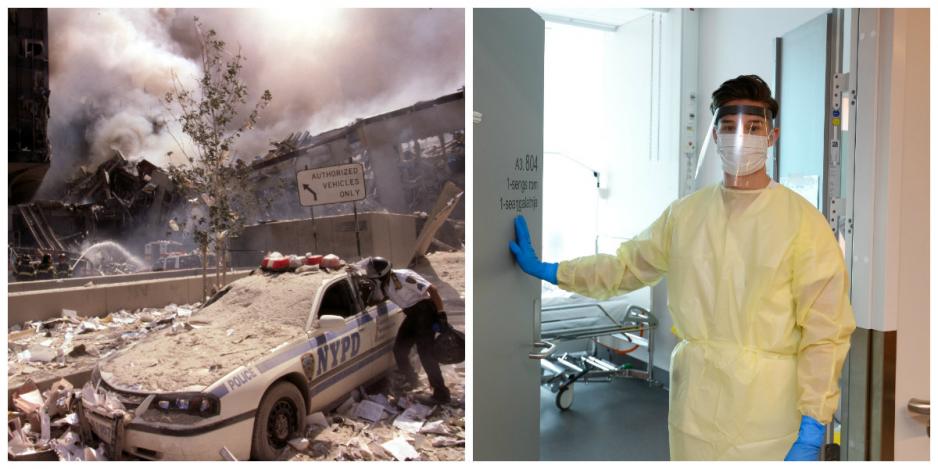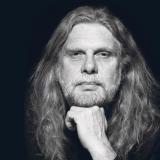A Whole Generation Bangs Its Head in the Wall for the Third Time

High North News’ Editor-in-Chief Arne O. Holm expresses concern for Generation Z, who have had to live through the terrorist attacks on September 11, the financial crisis a few year later, and now the global Corona pandemic. Photo from New York: Library of Congress (unattributed photograph)/Flickr, photo from hospital: Per-Christian Johansen, Universitetssykehuset Nord-Norge/Flickr
Commentary: I search for an explanation to what may appear to resemble a growing apathy; a new and unknown feeling. The life with office at home, almost void of people, the distance we are to maintain, are in and of themselves rather choking. But there is something more bothering me.
Feeling a sense of indifference is not the same as being indifferent.
In this recognition lies perhaps some of the explanation why my energy at times appears to leave my body rather than refill it, now that no planes are to be caught and my wrist watch is more of a bracelet, not a time-controlling machine continually asking me to move on to make it to the next appointment.
Because I make it to the next appointment. The biggest danger lies in my calendar being so emptied of content compared to what it was yet double-booking still being an issue. I believe that I am free at all times and say yes to any initiative without even checking my schedule.
Generation Z
It is not empty, after all, so my apathy does not stem from a calendar without meeting points.
It comes, I believe, from a growing worry about a generation which for the third time in its brief lifetime is in the middle of a reality it has not really deserved.
They are referred to as Generation Z, those who were born a few years before the terrorist attack on September 11, 2001 and who six or seven years later stumbled into the financial crisis, and who now find themselves in the middle of an economic and medical depression that is said to be worse than what happened in the 1930s. In Norway, we can safely add the terror attack on Utøya in 2011 to the series of events that have left and will continue to leave their marks on people who are still young.
20 years of disasters that changed a lot, but not everything.
The terror attacks in New York did not void us of terrorism as a language and means of action.
The financial crisis taught us zilch, but dramatically increased the difference between poor and rich. While a vast majority was struggling to find its feet, the world’s most powerful people managed to get the biggest pieces of the cake.
Did not take away hatred
The attacks on the government quarters and the murders on innocent young people at Utøya on 22 July, 2011 did not remove fear, hatred nr the series of brown-colored conspiracy theories.
All the fewer democratic countries
And now a pandemic adding unemployment as a brutal part of growing up. Because every statistic shows that vulnerability is larger the shorter you have made it in your attempt to build a life. Not only have the youngest amongst us been shut out from kindergartens, schools and universities for a long time. They also face closed doors when they are let loose onto a deflated job market, after employees from kindergartens to universities have, in admirable ways, fought us back to something resembling normalcy.
Perhaps my own emerging apathy would be less challenging if I had seen world leaders taking responsibility and demonstrating empathy in this situation. Instead, apathy threatens to stick with me because I face the exact opposite.
Because in addition to the economic, material and medical challenges following in the wake of the events of the past two decades, world leaders have taken the lead in dividing people, spreading conspiracy theories, removing democratic processes, starting trade wars, arming for war and legitimizing racism.
Decreasing democracies
The Economist Intelligence Unit has since 2006 analyzed the democratic development of the world. Last year was the worst so far. Only 22 out of the 193 countries in the world qualified as democracies. Only 430 million out of the world’s population of 7.8 billion people live in these countries. The index, that does not have its source amongst radical opponents, describes how democracy is gradually weakened in the USA and parts of Europe, or what the Economist refers to as “flawed democracies”.
Norway is at the top of the democracy index, and we should be proud of that.
There is not protection against the spit from the world’s most powerful
But also in our country, as in many others, the pandemic crisis is politicized, such as when the Progress Party finds it right to demand a closing of our borders for UN quota refugees as a favor if it is to support the government’s crisis packages.
It is our responsibility
When the apathy nevertheless does not quite stick, that is because I put my trust in the young among us being able to reveal the adults’ attempt at leading them into hatred, conspiracy theories and egotism.
I trust in their ability to learn from political leaders who take the lead in cooperation and equality across borders, races and religion, and to turn their backs to those who believe that hatred, egotism and lies are suitable company for a pandemic that is currently ruling the world. Even the part of the world in which narcissism is so prevalent that nothing makes any impression, save the faith in one’s own excellence.
Meanwhile we keep washing our hands, wear mandatory masks in the hope that they will protect us against the virus. There is not protection against the spit from the world’s most powerful.
The rest of us will have to take that responsibility.
This commentary was originally published in Norwegian and has been translated by HNN's Elisabeth Bergquist.

